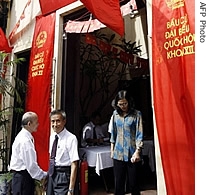2007年VOA标准英语-Vietnamese Voters Choose From a Narrow Range of(在线收听)
Hanoi
21 May 2007
Vote counting is underway after millions of Vietnamese went to the polls Sunday to elect a new National Assembly. Although voters had a slightly wider choice than in previous elections, all candidates were vetted by the ruling Communist Party. Matt Steinglass reports from Hanoi.
 |
| Residents leave a voting station in Hanoi, 20 May 2007 |
Ngo Gia An is the elections inspector in the Hanoi neighborhood of Nghi Tam. An says every single one of Nghi Tam's 1,662 voters exercised their right to vote.
That does not necessarily mean they were excited about the choices. Proof of having voted is sometimes required in Vietnam for certain certificates, and local party officials compete to produce high voter turnouts.
More candidates were competing this year, with 875 candidates competing for 500 seats. In Nghi Tam, voters had to choose three out of five candidates, including a woman, Nguyen Thi Nguyet Huong, who is not a Communist Party member.
The 62-year-old tea seller Pham Van Hung said he voted for her. Hung says he looked at candidates' resumes posted at polling stations. Little information is available about the candidates' policy positions.
Despite the limits, elections of the National Assembly help move Vietnam towards a system of government less dominated by the Communist Party, says Carl Thayer, a Vietnam expert at the Australian National Defense University.
"The Party has tried to create a situation where they give strategic direction to the country, and end their constant interference with day-to-day management and administration," he said. "How do you implement it? And that's what the National Assembly has done."
In recent years, the National Assembly has dramatically increased the amount of legislation it passes. Delegates have shown independence by altering proposed laws, and sharply questioning ministers accused of corruption.
But overall control still rests with the Communist Party. Only 30 out of 238 independents were allowed onto the ballot after screening, and non-communist political parties are banned.
As Thayer explains, the Party and the mass organizations shape the makeup of the Assembly by deciding which candidates to put forward.
"You know, the Party leaders determine what they call the structure and composition, and it's so many ethnic minorities, and women, and military, etc," he said. "And they come close to getting it."
Whatever the results of the vote counting, the government will point to the elections as evidence of overwhelming popular support.